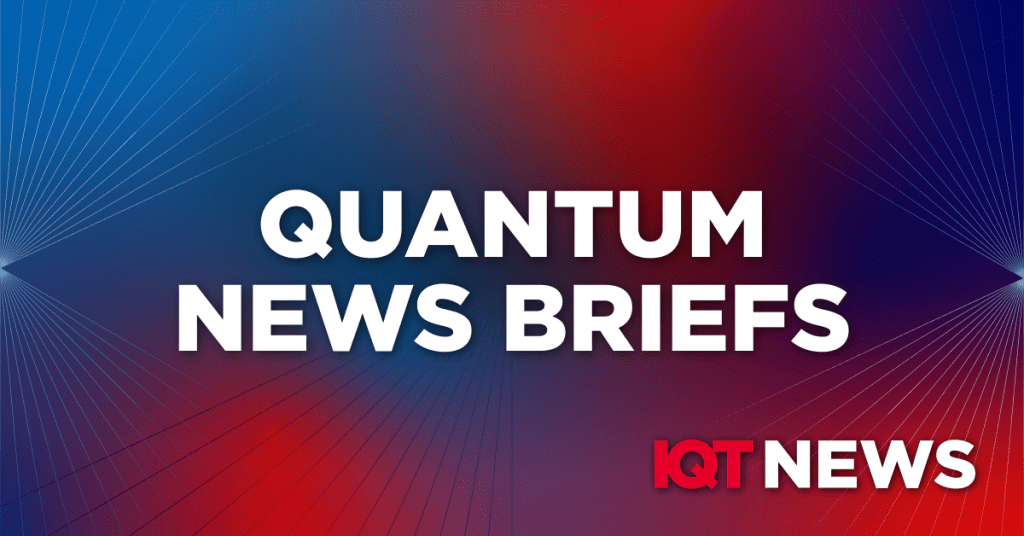News Releases:
Terra Quantum wins competitive SBIR funding to study feasibility of long-range quantum-resistant network for the US Air Force
Several US government agencies, including the Department of Defense, fund Small Business Innovative Research (SBIR) grants and contracts. The application process is highly competitive, with only about 15% of proposals winning a contract. The agency funds technology with the potential for commercialization within the defense industry. Terra Quantum won an SBIR contract for this project.
This contract is a significant milestone for both parties. It underscores the critical role of quantum technology in securing communications against future quantum threats, thus enhancing the efficiency and security of U.S. military assets.
Riverlane raises $75 million to meet surging global demand for quantum error correction technology
The round was led by Planet First Partners, the European growth equity sustainable investment platform, with participation from sustainability venture capital investors ETF Partners and Singapore-based global investor, EDBI. Existing investors Cambridge Innovation Capital (CIC), Amadeus Capital Partners, the UK’s National Security Strategic Investment Fund (NSSIF), and HPC leader Altair also participated in the Series C round.
Riverlane has built the world’s largest dedicated quantum error correction team with close to a hundred interdisciplinary experts working on its core product, Deltaflow ™. Applicable to quantum computers using all major qubit types, Deltaflow ™ comprises proprietary QEC chips, hardware and software technologies working in unison to correct billions of errors per second.
EuroHPC initiates tender process for new quantum computer EuroQCS-Italy in Bologna
The European High Performance Computing Joint Undertaking (EuroHPC JU) has launched a call for tender for the installation of EuroQCS-Italy, a new EuroHPC quantum computer to be integrated into the EuroHPC pre-exascale system Leonardo as per August 6 news release.
EuroQCS-Italy will be a quantum computer or -simulator based on neutral atoms. The system
EuroQCS-Italy will be available to a wide range of European users, from the scientific community to industry and the public sector. The acquisition and integration of quantum computers into existing HPC data centres is the EuroHPC JU’s first initiative to procure quantum computing hardware directly, which will be owned by the EuroHPC JU.
The EuroQCS-Italy consortium is led by CINECA, and includes the Academic and Research Network of Slovenia (ARNES) and the Forschungszentrum Jülich (FZJ) in Germany.
In Other News:
Meritalk covers NSF Director speech: US must invest in AI, Quantum or risk losing tech race
During an Aug. 2 event hosted by the Center for Strategic and International Studies, Panchanathan explained that the United States cannot have a repeat of what happened with semiconductors – the vast majority of which are now produced abroad.
While Panchanathan said the CHIPS and Science Act is an “absolutely necessary” investment, he stressed that the United States must act now to significantly ramp up its investments in AI and quantum in order to “leapfrog” other nations. “This is something that NSF is intensely focused on , , ,” he added. “But we need those resources, and done in a very timely way so that we can actually outcompete and outperform.”
Darío Gil – the new chair of the National Science Board (NSB), which serves as the governing board of NSF noted that even though the United States invented semiconductors, it “lost the leadership of that technology. . .”
“In AI and quantum, that cannot happen,” Gil warned. “We’ve identified the nature of the problem, but we’re not solving the problem yet. So, this is where the element of authorizations becoming appropriations is important.”
Health IT reports: “Cleveland Clinic deepens quantum and AI exploration”
Cleveland Clinic is partnering with the Novo Nordisk Foundation, a Denmark company focused on medical treatment and research, to launch the Cleveland Clinic – Denmark: Quantum-AI Biomedical Frontiers Fellowship Program.
Under the program, the Novo Nordisk Foundation will award up to $6.2 million over the next three years to facilitate the exchange of 12 researchers, according to an Aug. 5 news release from Cleveland Clinic.
Each researcher will receive a three-year term to conduct advanced research at either Cleveland Clinic or in Denmark. In Cleveland, the fellows will also have the chance to collaborate with IBM researchers through Cleveland Clinic’s Discovery Accelerator partnership.
The program will work to harness quantum technologies and AI to focus on scientific areas such as enhanced diagnostic precision, innovative drug discovery, optimization of clinical trials, and personalized medicine development.
